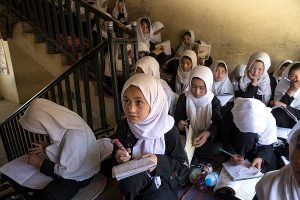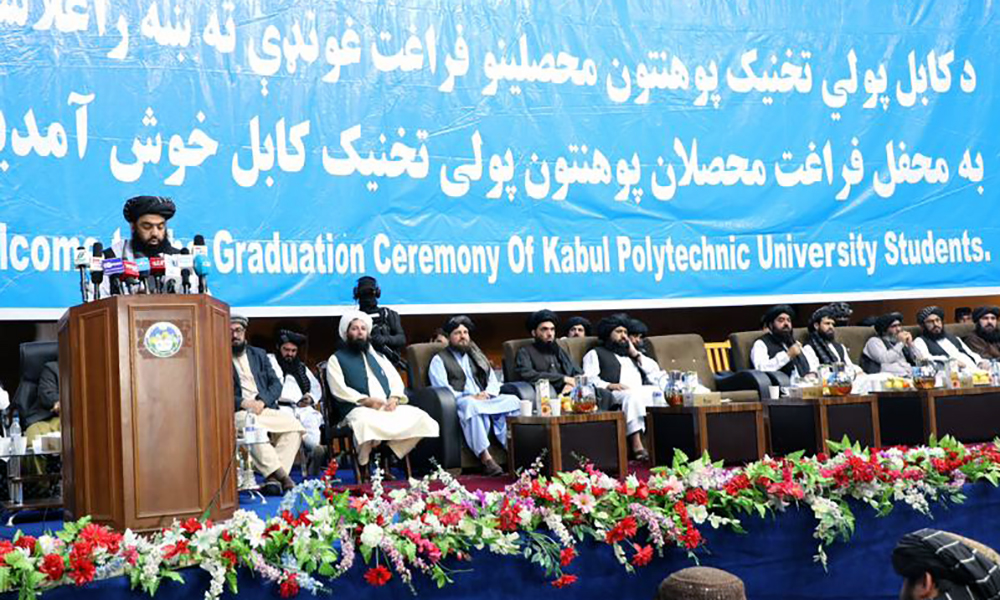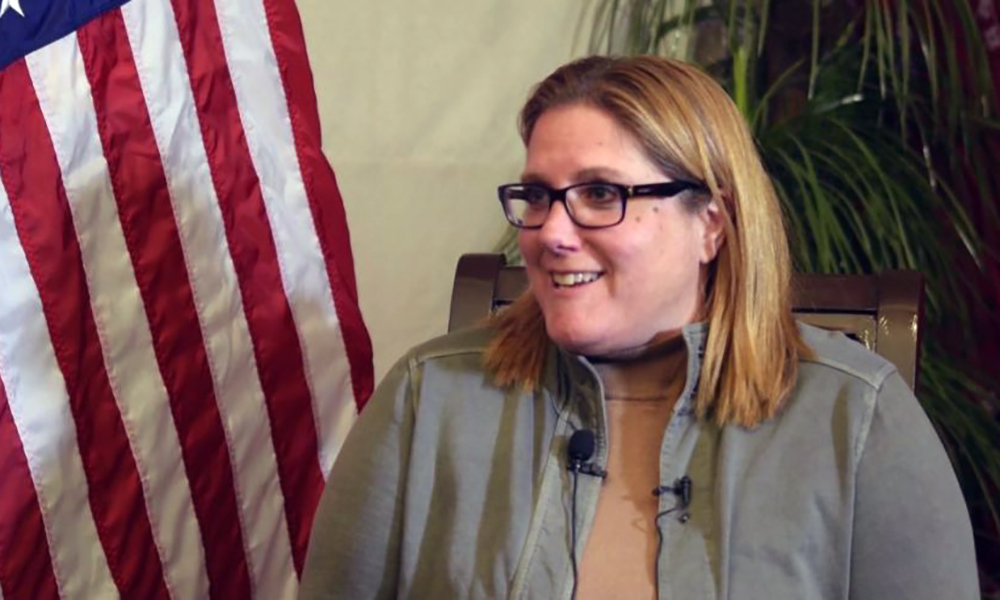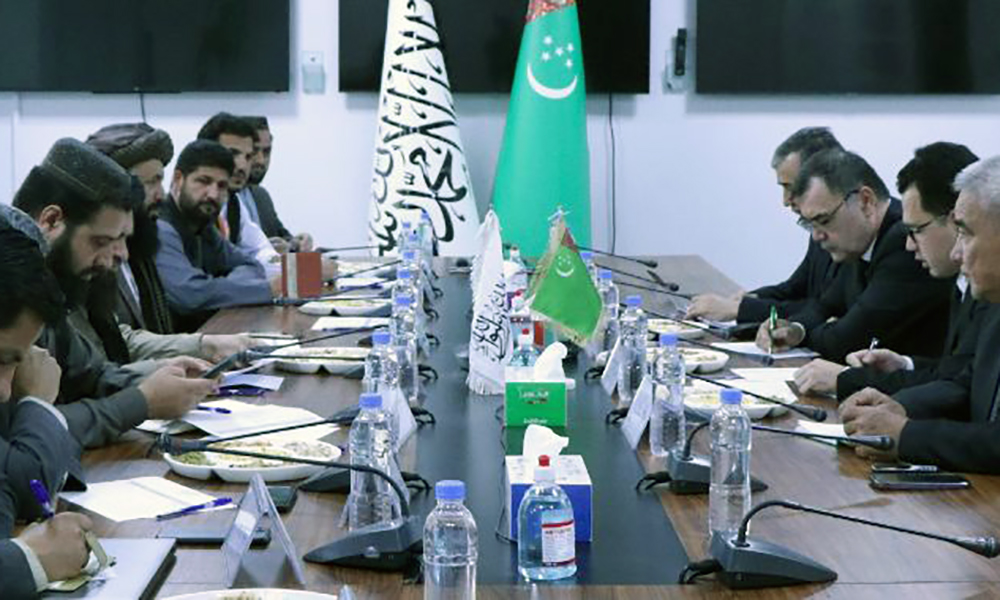Latest News
Two-Thirds of Afghan Girls Do Not Attend School: Report

 Two-thirds of girls in Afghanistan currently do not attend school, according to a new report from Human Rights Watch (HRW).
Two-thirds of girls in Afghanistan currently do not attend school, according to a new report from Human Rights Watch (HRW).
According to 132-page HRW report released on Wednesday, 41 percent of all schools in Afghanistan do not have buildings.
“Many children live too far from the nearest school to be able to attend, which particularly affects girls. Girls are often kept at home due to harmful gender norms that do not value or permit their education,” the report said.
Since the collapse of the Taliban in 2001 and the beginning of international civilian efforts to rebuild the country, girls’ education has become a focal point for both the Afghan government and its major donors.
The HRW report said that the Afghan government and its donors have made “impressive progress” in getting girls to attend school, but it was “not a completed task.”
The report examines the major barriers that remain in the quest to get all girls into school, and keep them there through secondary school.
“Discriminatory attitudes toward girls by both government officials and community members; child marriage; insecurity and violence stemming from both the escalating conflict and from general lawlessness, including attacks on education, military use of schools, abduction and kidnapping, acid attacks, and sexual harassment.”
“Poverty and child labor; a lack of schools in many areas; poor infrastructure and lack of supplies in schools; poor quality of instruction in schools; costs associated with education; lack of teachers, especially female teachers; administrative barriers including requirements for identification and transfer letters, and restrictions on when children can enroll; a failure to institutionalize and make sustainable community-based education; and corruption,” the report finds.
The ongoing conflict “discourages families from letting their children leave home and families usually have less tolerance for sending girls to school” in an insecure environment, the report said, adding that “a single attack can frighten hundreds of girls’ parents out of sending them for years to come.”
The Afghan Education Ministry, however, said that it has plans for the improvement of girls attending schools.
“Appointing 30 thousand teachers at schools is a part of these plans,” said Education Ministry Spokesman, Mujib Mehrdad. “The other [plan] is to enhance the girls’ presence in education management and schools.”

Latest News
Kabir reiterates IEA will not give in to international pressure

Mawlavi Abdul Kabir, the political deputy prime minister, said on Tuesday that the Islamic Emirate will not give in to international pressure and will not take orders from any country.
Speaking at the graduation ceremony of Kabul Polytechnic students, Kabir said that transit within the region is not possible without Afghanistan and that the government is working on the issue.
Kabir also said the Islamic Emirate of Afghanistan (IEA) is working on the implementation of projects and on developing the mining sector.
He also emphasized the need to provide conditions for the return of immigrants to the country.
The Islamic Emirate’s minister of Propagation of Virtue and Prevention of Vice, Mohammad Khalid Hanafi, also spoke at the event and said the IEA is not against the development of modern sciences in the country, but that Western countries are spreading negative propaganda against the Islamic Emirate.
Nada Mohammad Nadim, Acting Minister of Higher Education, also emphasized that the Islamic Emirate was victorious on the battlefield and will also win in the field of economy, health and education.
On the other hand, some officials of the Ministry of Higher Education said that the ministry is trying to make progress in the direction of scientific and educational expansion and to be equal to global standards.
Over 530 students graduated from seventeen departments of this university, and their graduation certificates were presented by the authorities of the Islamic Emirate.
Latest News
US shows greater willingness to engage with the IEA

Washington is willing to move towards greater engagement with the Islamic Emirate of Afghanistan (IEA) as it seeks to tread a fine line between its human rights concerns and helping the Afghan people, interviews with top US officials and senior aid figures reveal.
Speaking to The New Humanitarian on the sidelines of a donor meeting in Istanbul last month, Karen Decker, chargé d’affaires of the US mission to Afghanistan, said Washington has “learned the hard way that isolation is ruinous. It’s ruinous for the Afghan people. It’s ruinous for the region”.
In the past year, the UN, several international and local NGOs, and Washington have all signaled that avoiding the Islamic Emirate won’t solve Afghanistan’s economic and humanitarian issues, The New Humanitarian reported.
This comes despite the IEA still refusing to allow girls and women to study beyond the sixth grade.
Decker told The New Humanitarian that Washington is now in a position where it must “very carefully navigate the non-recognition policy”, which requires a delicate balance of keeping in mind that the IEA took power by force rather than a democratic vote while still finding ways to reach the millions of Afghans who require emergency assistance.
One NGO source, who asked to remain anonymous, was quoted as saying by The New Humanitarian that “engagement [with the IEA] is necessary, but we have to find a way to balance engagement while not compromising on our principles.”
Decker agreed, saying Washington would continue to engage with the IEA on “pragmatic issues”, with humanitarian assistance and human rights being her primary areas of concern.
Because its non-recognition policy precludes US officials from working in the country, Washington has partnered with local and international groups on the ground to deliver assistance directly to the Afghan people.
But even with that cooperation, it’s not always so easy, as these groups must also tread carefully amid increasing IEA restrictions and regulations, The New Humanitarian reported.
Even though there is still a long way to go, particularly in terms of addressing US human rights concerns, Decker told The New Humanitarian she feels Washington’s efforts have led to some positive results.
“Eighteen months ago, we were worried about famine, and there is no famine in Afghanistan,” Decker said, crediting this largely to the work of local and international aid organizations.
However, she pointed out that Afghans still need more food assistance than in the past: “So, in some respects, you trade one problem for another.”
Decker raised another issue that adds to the difficulty of engaging further: the Islamic Emirate’s unwillingness to acknowledge any problems in the country: “They like to present Afghanistan as a success story… [and] they don’t want anyone thinking there’s anything wrong.”
She said if the Islamic Emirate were more straightforward to deal with, then humanitarian actors would save a lot of time and money and be able to reach those in need more quickly.
“We use a lot of time and effort making it work, because of the Taliban (IEA). They are fundamentally the challenge to making this work. We are able to navigate [it], but it would be much more efficient if the Taliban were much more [open].”
Decker did, however, give the Taliban some credit, saying they had shown some flexibility, especially in emergency situations.
She pointed to the Islamic Emirate’s responses to a series of earthquakes that rocked the western province of Herat, and the recent mass expulsions of hundreds of thousands of Afghans from neighboring Pakistan, as examples of when the IEA saw it necessary to amend or loosen some of their restrictions, The New Humanitarian reported.
“Women were suddenly allowed to work because they had to reach women beneficiaries,” she said.
While engagement efforts have sparked widespread criticism, all the sources The New Humanitarian spoke to said they saw little benefit in pretending the Islamic Emirate does not exist.
With an “overwhelming need in the country”, simply ignoring the IEA will do nothing to improve the lives of the millions of Afghans who remain in need, said Decker.
“It’s not in anyone’s interest for us to isolate the country,” she added. “And I say this over and over: I feel strongly that if the United States does not advocate for the Afghan people, nobody will. So, I don’t need any more motivation than that.”
The New Humanitarian reached out to the Islamic Emirate’s Ministry of Foreign Affairs for comment on several matters related to the issue of engagement, but it failed to respond.
Decker and other sources did however, express some hope based on private meetings and the public statements of several high-ranking Islamic Emirate officials, who have acknowledged that all girls and women should be allowed to return to school and that the government must expand beyond just the IEA.
“We know that there [are] senior Taliban leaders who have their daughters in school outside of the country, and some of them have even been open in their own statements about the importance of education,” said Decker.
However, for progress to be made towards US recognition, she said the Islamic Emirate must officially change some of its policies, pointing to increased work opportunities for women and real inclusion of non-IEA members in the government as concrete examples of possible game-changers.
Latest News
Afghan, Turkmen officials discuss early completion of Herat Noorul Jihad substation

Da Afghanistan Breshna Sherkat (DABS) leadership has met with a delegation from Turkmenistan to discuss the completion and inauguration of the new Herat Noorul Jihad substation.
At the meeting, Mawlawi Abdul Rahman Rahmani, Chief Operating Officer of DABS, provided an update on the progress of the substation and said work on the project is almost complete.
It was agreed that the substation will be operational once all remaining technical issues between the two parties are resolved.
Murad Artikov, Turkmenistan’s Head of International Projects, commended DABS for its cooperation in the construction of the Noorul Jihad substation, and expressed confidence that the project will be completed in the near future.
He also said that a protocol outlining equipment and technical matters will be finalized by both parties.
Upon the completion of this project, the import of electricity from Turkmenistan to Herat is expected to increase, benefiting thousands of new customers in the province.
-

 Sport4 days ago
Sport4 days agoAfghanistan beat Iraq 5-3, inch closer to Futsal World Cup berth
-

 Regional4 days ago
Regional4 days agoNew UK sanctions target Iranian drone industry
-

 Latest News4 days ago
Latest News4 days agoEU allocates 17 million euros to support Afghans on the move
-

 Latest News3 days ago
Latest News3 days agoPakistan extends registered Afghan refugees’ stay till June 30
-

 World5 days ago
World5 days agoUS student protests over Gaza intensify despite arrests
-

 Regional3 days ago
Regional3 days agoChina to host Hamas, Fatah for Palestinian unity talks
-

 Sport2 days ago
Sport2 days agoAfghanistan qualify for FIFA Futsal World Cup for first time ever
-

 Latest News4 days ago
Latest News4 days agoTripartite trade meeting held in Kabul to boost regional connectivity
















